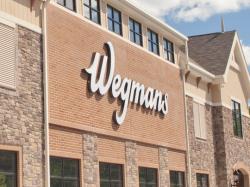Wegmans, Trader Joe's, Publix, Costco & Sprouts Top Consumer Reports Ratings
March 28, 2014 | 4 min to read

YONKERS, NY — When it comes to supermarkets, biggest isn’t always best. In Consumer Reports’ latest survey, Wegmans, Trader Joe’s, Publix, Costco and Sprouts earned the highest scores overall among 55 of the nation’s major grocery stores; Walmart, America’s largest grocer, landed at the bottom of the ratings, based on a survey of 27, 208 subscribers.
The report, which includes the entire Ratings of grocery stores and tips for saving time and money at the supermarket, is available in the May issue of Consumer Reports and at www.ConsumerReports.org.
Consumer Reports survey, which reflects 48,076 shopping visits, reveals readers satisfaction with service. While most respondents said they were quite satisfied overall, more than half had at least one complaint about their current store. Almost a third of respondents cited two or more problems. However, no chain tried their customers’ patience more than Walmart Supercenter.
The biggest gripe overall: Not enough open checkouts (cited by 19 percent of shoppers), followed by congested aisles, out-of-stock advertised specials, and lack of choice. Walmart shoppers surveyed were especially irritated by too few open checkouts, out-of-stock basic items, and spotty price labeling.
Store choice matters because Americans are heavily invested in their supermarkets. One-third of subscribers surveyed told Consumer Reports they had quit shopping at a nearby grocery store in the past year, mostly because of high prices, but also because of long waits, inadequate selection, or poor food quality. Fifty-eight percent of respondents gave a store the boot because of prices, compared with 43 percent in 2011.
Fortunately, most consumers have several shopping choices, and some supermarkets gave customers much of what they want. National grocers Costco and Trader Joe’s, along with Publix (South), Sprouts (West), and Wegmans (East), offer better quality meat and produce and a cleaner shopping environment. All but Costco also earned the highest possible marks for service, defined as employee courtesy and checkout speed. Service is minimal at warehouse clubs such as Costco, and lengthy lines are a trade-off for day-in, day-out deals.
How to Shop Cheaper, Smarter & Faster
Supermarkets are giant selling machines in which traffic patterns, product placement displays, and smells encourage shoppers to open their wallets. Consumer Reports offers advice to resist both the hard and soft sell and strategies that will save shoppers time and money:
- SHOP CHEAPER. Three-quarters of respondents said they scan supermarket circularsfor specials, take advantage of manufacturer coupons, and buy store brands. Here are some examples of other ways to save:
Shop early in the sales cycle. Eleven percent of readers complained about stores being out of advertised specials. Consumer Reports found that the best time to find the type of bargains prominent in circulars was at the beginning of the cycle (usually Friday or Saturday).
Be loyal. Many chains reserve their best deals for customers who enroll in loyalty- or bonus-card programs. And some have a fuel-reward component; the typical discount is 10 cents a gallon at participating gas stations for each $50 spent at the store.
- SHOP SMARTER. Smart shopping begins with understanding how goods are priced and marketed, and how stores coax shoppers into buying them.
Know the high-low game. Most stores lure customers with weekly specials on staples such as cereal, bacon, and detergent, then raise prices on other goods to offset those “loss leaders.” Follow the flyers to see what staples go on sale at predictable intervals, then stock up and save.
Beware of tricky signs. The sign reads “10 for $10,” but shoppers usually don’t have to buy all ten to get the discount; buy one for $1.
- SHOP FASTER. Here’s some ways shoppers can make their trip to the grocery store quicker and more efficient:
Go mobile. Most chains have rolled out apps for iPhone and Android devices that let users create grocery lists, browse weekly circulars, view product photos, add manufacturers’ coupons to an account, check off items placed in a virtual cart, scan bar codes of products at home to be added to the list, and get real-time prices. Many of these tasks can be done online, too.
Self-checkout. At least 60 percent of supermarkets have one or more self-checkout stations to let people scan, bag, and pay for groceries without a cashier. Theoretically, they let shoppers skip long lines. Fifty-six percent of survey respondents used self-checkout in the last year, and 67 percent of them said it saved time.
Consumer Reports is the world’s largest independent product-testing organization. Using its more than 50 labs, auto test center, and survey research center, the nonprofit rates thousands of products and services annually. Founded in 1936, Consumer Reports has over 8 million subscribers to its magazine, website and other publications. Its advocacy division, Consumers Union, works for health reform, food and product safety, financial reform, and other consumer issues in Washington, D.C., the states, and in the marketplace.
Publication date 03/26/14
© Consumer Reports 2014. The material above is intended for legitimate news entities only; it may not be used for advertising or promotional purposes. Consumer Reports® is an expert, independent nonprofit organization whose mission is to work for a fair, just, and safe marketplace for all consumers and to empower consumers to protect themselves. We accept no advertising and pay for all the products we test. We are not beholden to any commercial interest. Our income is derived from the sale of Consumer Reports®, ConsumerReports.org® and our other publications and information products, services, fees, and noncommercial contributions and grants. Our Ratings and reports are intended solely for the use of our readers. Neither the Ratings nor the reports may be used in advertising or for any other commercial purpose without our permission. Consumer Reports will take all steps open to it to prevent commercial use of its materials, its name, or the name of Consumer Reports®.
Source: Consumer Reports
